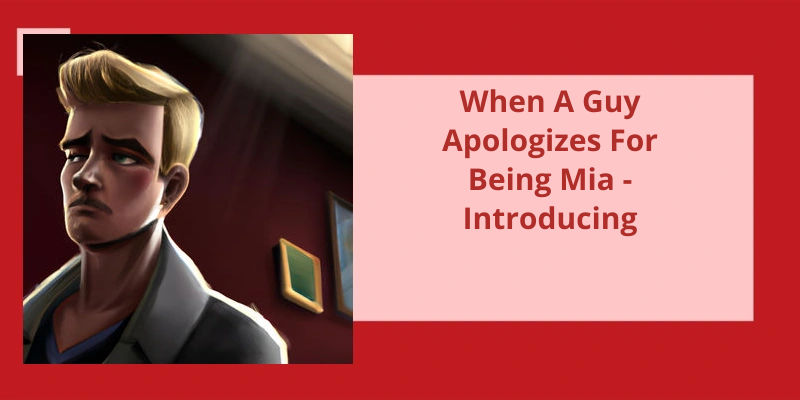For millennials and Gen Zers, "ghosting" has become a common phenomenon in the modern dating scene. It's when someone suddenly stops all communication without any explanation, leaving the other person in a state of confusion and disappointment. Ghosting can happen for various reasons, but one of the most puzzling reasons is when a guy ghosts you even though he seemingly likes you. The question that often arises in this scenario is whether someone who really likes you’d ghost you. Ghosting isn’t an act of affection but rather an act of ambiguity and avoidance. Therefore, a guy who truly likes you won’t leave your messages on seen or make you feel ignored and unimportant. This behavior is reserved for those who aren’t invested in the relationship or have different priorities. In general, if someone is interested in you, they’ll make it known and prioritize your relationship.
Why Do Guys Ghost When They Like You?
It could be a sudden job opportunity, a family emergency, or any other event that takes their focus away from dating. They may not want to burden you with their problems or they may think it’s better to keep their distance until the situation resolves itself. Another possible reason why guys ghost is that they’ve second thoughts about the relationship after a few dates. They may have enjoyed your company initially, but then realized that youre not the right match for them. They may feel guilty about leading you on, but don’t know how to let you down gently. In some cases, guys ghost because they’re afraid of getting hurt themselves. They may have been in a bad relationship before and don’t want to repeat the same mistakes. Alternatively, they may have low self-esteem or trust issues that make them hesitant to open up to someone new. They may have swiped right on you out of boredom, curiosity, or politeness, but didnt feel any sparks when they talked to you. They may have a long list of matches that theyre juggling and don’t want to waste time on a connection that doesn’t excite them. Whatever the reason, being ghosted can be frustrating, confusing, and hurtful. If youve been ghosted, try not to take it personally. Remind yourself that it’s not a reflection of your worth or attractiveness, but rather a sign that the other person wasnt ready or willing to pursue a relationship with you. Dont waste your time and energy trying to chase after someone who doesn’t want to be caught. Focus on your own goals, passions, and hobbies, and trust that the right person will come along when you least expect it.
Tips on How to Cope With Being Ghosted.
- Stay calm and rational.
- Don’t try to contact the person who ghosted you.
- Take care of yourself.
- Try to understand why the person may have ghosted you.
- Reflect on whether the relationship was healthy for you.
- Seek support from friends and family.
- Consider therapy or counseling if needed.
- Let the experience help you grow and move forward.
Ghosting after a date is unfortunately one of the common occurrences in the dating world. It leaves the person who got ghosted confused, hurt, and wondering what they did wrong. While it’s important to move on from someone who’s ghosted you, it’s also crucial to understand why someone may choose to ghost instead of having an honest conversation.
What Is Ghosting After a Date?
Ghosting after a date is a behavior that’s become increasingly common in modern dating. It stems from the ease of communication in the digital age, which has made it easier for individuals to disappear without explanation. Essentially, it means that one person ceases contact without explanation or closure.
The impact of ghosting can be significant for the person left behind. It can create feelings of confusion, anxiety, and self-doubt. The lack of closure can make it difficult for the person who’s been ghosted to move on, as they’re left wondering what went wrong or how they could have prevented the outcome. In some cases, ghosting can be a form of emotional manipulation or abuse, as it leaves the target vulnerable and unsure of where they stand.
In some cases, it may be due to a lack of interest or attraction. The person may feel that it’s easier to just stop contact rather than have an uncomfortable conversation. In other cases, the person may have other priorities or issues that prevent them from pursuing a relationship. They may be dealing with personal issues, or may simply not be ready for a serious commitment.
One of the challenges with ghosting is that it’s difficult to confront the person responsible. In many cases, the person who’s been ghosted may never know the true reason behind the behavior. This can create a sense of powerlessness and frustration. However, it’s important to remember that ghosting says more about the person who’s doing the ghosting than the person who’s being ghosted.
Ultimately, the best way to prevent ghosting is to practice clear and effective communication. This means being honest and transparent about your intentions, feelings, and priorities. It also means respecting the other persons time and emotions, and being willing to have difficult conversations if necessary. By working together to build healthy, respectful relationships, we can reduce the incidence of ghosting and create more positive dating experiences for everyone involved.
How to Cope With Ghosting After a Date?
Ghosting after a date can be a difficult experience. Coping with it involves recognizing that you deserve to be treated with respect and dignity. Give yourself time to process your emotions, but avoid obsessing over the situation. Consider reaching out to the person and expressing your feelings or simply moving on to someone who values your time and effort.
Source: Is it okay to ghost someone after one date?..
It’s never easy to realize that a friend may be ghosting you. You may be confused about what happened or wondering if you did something wrong. However, it’s important to understand that there could be many reasons for this behavior and it isn’t necessarily your fault. In this article, we will explore some of the common reasons why friends ghost each other and discuss what steps you can take to address the situation.
Why Do I Feel Like My Friend Is Ghosting Me?
It’s important to understand that people change over time, and friendships can naturally ebb and flow. However, this doesn’t make it any easier to deal with when you feel like someone is intentionally avoiding you. It can lead to feelings of rejection, hurt, and confusion.
Another reason why your friend may be ghosting you is because they’re going through a difficult time in their own life and are struggling to maintain any semblance of normalcy. They may be dealing with personal issues such as anxiety, depression, or family problems, and may not have the energy to maintain friendships at this time. It’s important to approach the situation with empathy and understanding, rather than assuming that they’re deliberately ignoring you.
In some cases, you may have inadvertently done something to upset or offend your friend, leading them to withdraw from the friendship. It can be helpful to reflect on your recent interactions and try to pinpoint if there was a specific incident that may have caused a rift in the friendship. If this is the case, it may be worth reaching out and apologizing, and trying to work through any issues that may be causing tension.
Ultimately, it’s important to remember that you can’t control other peoples behavior or actions. As tough as it may be, it’s better to focus on the relationships in your life that are positive and fulfilling, rather than dwelling on those that may have ended. Remember that friendships come and go, but the ones that truly matter will endure.
Coping Strategies for Dealing With the Emotional Toll of Being Ghosted
- Practice self-care: Take time for yourself to do things you enjoy and that make you feel good, like exercising, meditating, or spending time with loved ones.
- Reach out to friends and family: Talking to trusted friends and family members can help you process your feelings and provide much-needed support.
- Avoid obsessing over the situation: Try not to fixate on the person who ghosted you or the reasons why they did it. Instead, focus on moving forward and taking care of yourself.
- Get closure: If possible, it can be helpful to have a conversation with the person who ghosted you to get closure and better understand what happened.
- Reflect on the situation: Use the experience as an opportunity to learn more about yourself, your boundaries, and what you want in future relationships.
- Seek professional help: If you’re struggling to cope with the emotional toll of being ghosted, consider seeking the help of a therapist or mental health professional.
While ghosting is generally frowned upon as an immature and insensitive means of communication, there are certain scenarios where it may be justified as a means of ending communication. These exceptions can range from situations where continued communication could be dangerous or harmful, to instances where it simply makes sense to move on without explanation or confrontation. Whether or not ghosting is an acceptable course of action largely depends on the circumstances surrounding the situation and the individuals involved.
Is It Okay to Ghost Someone You Like?
Ghosting someone is a complex and sensitive issue that should be approached carefully. It involves severing a relationship without any explanation or warning, which can leave the other party feeling confused and hurt.
However, in some cases, ghosting can be the safest and healthiest option for both parties involved. For example, if someone is experiencing harassment, stalking, or abuse, ghosting may be the only way to protect themselves and limit contact with the other person. In these situations, it’s crucial to prioritize personal safety and well-being above social norms or expectations.
It’s important to remember that communication and honesty are key components of healthy relationships, and by avoiding them, we risk damaging important connections and isolating ourselves from meaningful interactions.
When you’ve been ghosted, it can be challenging to know whether to expect the person to come back or move on. The truth is, there’s no one-size-fits-all answer to how long it takes for ghosters to return. However, it’s essential to understand that the reasons behind ghosting and reappearing can vary significantly, depending on the situation. Let’s explore the different scenarios in detail.
How Long After Ghosting Do They Come Back?
One of the most common reasons for ghosters to come back after disappearing is a change in priorities. Perhaps the person was going through a busy or stressful time in their life and didnt feel like they could maintain a relationship. Once things calm down, they may realize that they miss you and want to reconnect. Alternatively, they may have re-prioritized their life and decided that a romantic relationship is important to them after all.
For example, they may have gone through a breakup and now find themselves lonely and thinking about you again. They may feel regretful about their past behavior and want to make amends. Or perhaps theyve moved to a new city or started a new job and are looking for familiar connections.
Perhaps they initially werent sure about their feelings towards you, but after taking some time apart, theyve realized that they do have feelings for you. Alternatively, they may have initially been hesitant to start a relationship, but have since decided that theyre ready to make a commitment.
This is definitely a selfish reason to reach out and it’s important to be wary of individuals who’re playing games or using you for their own emotional satisfaction. It’s important to protect your own emotional well-being and set boundaries if necessary.
Overall, it’s difficult to know what motives someone may have for coming back after ghosting. It’s important to communicate clearly and honestly so that you can understand each others intentions and make informed decisions. Remember that you always have the right to say no and protect yourself if someone is treating you poorly.
Conclusion
Ghosting is a harsh and hurtful practice that leaves many people feeling confused, rejected, and alone. While it's easy to assume that a guy who ghosts you simply isn't interested, the truth is often far more complicated. There are many reasons why someone might choose to disappear from your life, ranging from personal problems to a lack of emotional maturity. However, when it comes to the question of whether a guy will ghost you if he likes you, the answer is clear: if he truly cares about you and wants to be with you, he’ll not resort to such a cowardly and insensitive behavior. Instead, he’ll be honest, upfront, and communicative, even if it's not always easy or convenient. Ultimately, it's up to each individual to decide what kind of relationship they want and what they're willing to tolerate. But one thing is for certain: if you're looking for a partner who’ll treat you with the respect and consideration you deserve, ghosting is a red flag that shouldn’t be ignored.






